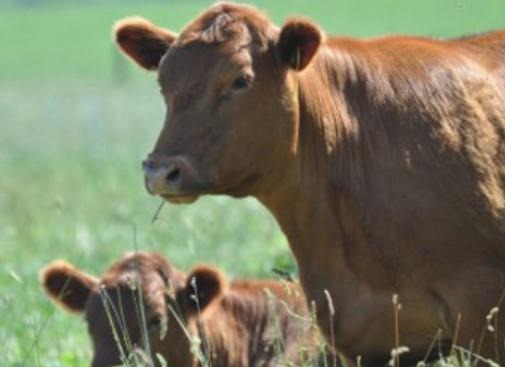By Kable Thurlow
New grass-fed beef research findings will be presented at MSU Agriculture Innovation Day on Aug. 24, 2017 at the Lake City Research Center.

The MSU Lake City Research Center is noted as one of the leading university research centers in the world on grass-fed beef production. During the grass-fed beef session at MSU Agriculture Innovation Day, attendees will hear from two experts who worked closely on the project:
- Kable Thurlow, Michigan State University Extension beef educator, will cover the lessons learned from the five-year grass-fed beef research study.
- Jon Nelson, a cooperator in a SARE Grass-Fed Beef project, will share his experiences in transitioning his farm from cash crop to grass-fed beef.
MSU Researchers and Extension educators have been testing ideas and developing a production model to build the case for using adaptive grazing management as an alternate method for producing highly nutritional food using sunlight and land. The model requires less inputs of seed, fertilizer, fuel, labor and depreciating capital than the traditional cash crop model.
In addition to growing healthy livestock on the topside of the soil, the model also grows healthy biology underneath the soil surface. This system increases the water holding and filtering capability of the land in order to preserve these scarce resources for our future generations.
Since the first calves hit the pastures in 2011, the MSU Lake City Research Center has finished out over 70 head of steers per year, making the total number of steers finished on an all-forage diet over 300 head.
Cooperator farms in the USDA NCR SARE grant program produced more than 300 head of grass-finished beef. Most of this beef was consumed in Michigan, through on-farm wholesale, to companies like Cherry Capital and through various other wholesale markets.
JNelson Farms in Midland has been working in close cooperation with MSU for the past six years to transition from a cash crop farming operation to a low input rotational, grass-fed beef. JNelson Farms started with 20 head of beef cattle in 2011. In 2017, the herd includes 105 head of breeding stock, 150 head of grass finishing cattle and 100 newborn calves. Through cooperation with multiple producers, JNelson Farms is involved in raising and marketing cattle throughout both the Lower and Upper Peninsula of Michigan.
Join Jon Nelson and Kable Thurlow, as they share what MSU Lake City Research Center has done and how JNelson Farms has changed over the past six years using research generated at the Lake City Research Center. As we share information that producers can take back to their farms and use to increase their triple bottom line of being 1) Productive and profitable, 2) Environmentally regenerative, and 3) Socially beneficial.
MSU Agriculture Innovation Day is an annual event focusing on in-depth education on critical topics. The event rotates to various locations throughout the state to give farmers access to experts who can help them improve their businesses while maintaining environmentally sound practices on their farms. To learn more about the event and the sessions being offered, visit msue.msu.edu/msuaginnovationday.
Source:msu.edu